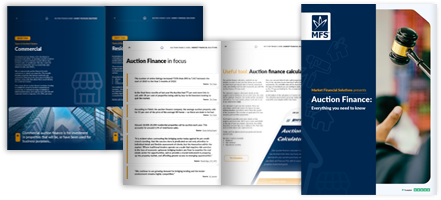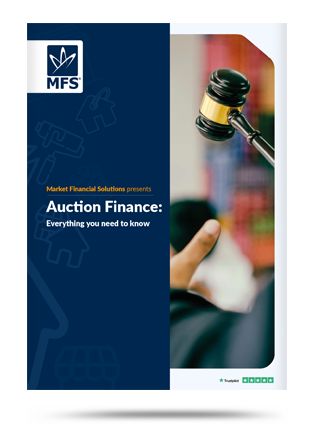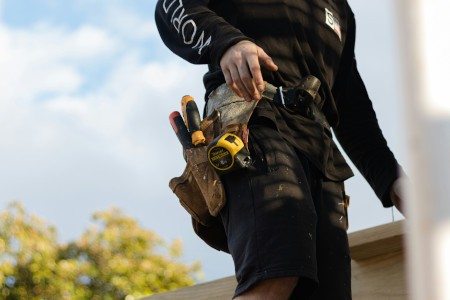Disclaimer
Market Financial Solutions are a bridging loan and buy-to-let mortgage provider, not financial advisors. Therefore, Investors are encouraged to seek professional advice. The information in this content is correct at time of writing.

Online property auctions have risen in popularity in recent years, as the pandemic forced change. In-person auctions have always been popular with property investors. They present the potential opportunity to purchase an underappreciated property so investors look to secure a bargain. But, during the peak lockdown years, bidding in person became tricky.
As such, the market had to adapt to survive. Many auction houses expanded their online capabilities and soon, a clear preference emerged for many.
What’s more, online property auctions are still in demand now, even as we put the worst of the pandemic behind us. So, with property auction season quickly approaching, we put this blog together to help you get ahead.
We’ll address – how do online property auctions work, what elements you should prioritise, and what financing options are available to you.
Source: The Spectator
What is an online property auction?
In simple terms, online property auctions – sometimes known as “conditional auctions” or the “modern method of auction” – work in a very similar way to in-person auctions. A property is listed, investors bid on it, and the highest bid secures the property. The bidding itself though will be done online, usually through a livestream, an app, or a specifically designed platform.
Generally though, there is more leeway in the bidding process. Online bids can be made 24 hours a day, seven days a week. At the end of the online auction period, which can be much longer than in-person auctions, the highest bid wins.
Online auctions can provide many advantages for property investors. Typically, the process is transparent and can be participated in from anywhere. All that’s needed is a decent internet connection.
But there are also some cons to consider. How do online property auctions work may be less of an important question than should you participate at all? A longer bidding period can allow for more time to be outbid by a rival. There may also be higher costs and tax bills to consider.
Also, you need to be aware of whether you’re participating in an unconditional, or conditional online auction. In unconditional auctions, the exchange of contracts happens immediately as the “hammer falls” or as the online time period ends. These bids then need to be completed within a couple of weeks or so.
Conditional online auctions usually have longer exchanging periods, sometimes stretching to 56 days. This can provide bidders with more time to organise finance following a purchase.
Online auctions themselves can last for a while, sometimes ranging between 7 and 30 days. Whereas in-person auctions can be over in mere minutes.
Source: HomeOwnersAlliance, SDL Auctions, Auction House London
How do online property auctions work?
Online property auction procedures and operations will vary between auction houses. Each will have differing availability, platforms, and priorities. But, generally, property investors should expect, and prepare for the following kind of process.
Step 1: Find an option you’re happy with
From the outset, you should find an online property company you’re happy and comfortable with. There are many options out there. Some auction houses may specialise in certain locations, or only offer specific property types.
You’ll want to take the time to find a provider that offers the right options for your end-goals. Auction houses will usually show their upcoming auctions on their websites.
Source: Property Investments UK
Step 2: Get your paperwork in order
Once you’ve found one you’d like to participate in, you’ll likely need to pre-register. This could involve reservation fees, deposits, ID and anti-money laundering checks. As such, you should get organised well ahead of the bidding date.
For the lot itself, you’ll want to check the guide price, which highlights how much the property might be worth. There is also a reserve price, which is the minimum a property will be sold for, but this is a confidential figure set between sellers and auctioneers.
Also, where possible, you should try to visit a property you’re bidding on ahead of time, arrange a survey, make the necessary legal checks. You could perhaps even shop around for buildings insurance. In the lead up to the bidding, you’ll want to be sure of your budget, what you can afford, and that you at least have a plan for financing.
Source: Which?, Auction House

Step 3: Bid
When the time comes, you’ll need to be ready for the bidding. Online bidding is unlikely to be as intense as it would be in person, given the auctions can last for several days. But it may be more labour-intensive. You may need to dedicate more time to monitor your rivals’ bids to have the best chance of success.
To reduce the admin of this, many auction houses will allow you to set a maximum bid ahead of time. This will not only free up your time, but also prevent you from overspending.
Be aware though, often in live bids, most of the action is seen in the final few minutes. Buyers will swoop in at the last minute to try and bag a bargain. If you’re following along in real time, panic may set in and lead to knee-jerk reactions. Throughout, you should keep your budget at the back of your mind.
Source: Auction House London, The Times
Step 4: Cover the costs
Just as is the case with in-person auctions, the highest online bid will win. The dropping of the gavel marks the exchange of contracts, and you’ll likely need to cover a 10% deposit.
While completion times may be longer in the online auction world, the costs involved may be higher. More so than a conventional auction or through an estate agent. Buyers may need to cover a reservation fee, and part of the seller’s costs – including the cost of a legal pack.
Also, VAT may be charged on top, and Stamp Duty could also be applicable to these fees. These costs can vary from auction to auction, so you’ll need to do your research well in advance.
All of this is somewhat of a simplification, of course. To really understand how do online property auctions work, you’ll want to seek out expert guidance.
Source: Property Investments UK
Why should you care?
Understanding how this process works is important, given the shifts in demand we’ve seen in recent years. Online property auctions have become very popular with investors. The number of lots sold in a physical auction room fell by 66% between the start of 2020, and the final three months of 2022.
Nearly 5,200 lots were sold in a physical auction room in early 2020, falling to around 1,700 by the end of 2022, according to the Essential Information Group (EIG). During the same period, the number of online listings rose 733%, from 890 to 7,417.
Moreover, property investors in general have moved towards auctions as the wider market slowed down. In Autumn 2022, buyers turned to auction houses to invest ahead of anticipated interest rate hikes. Auctions can be wrapped up in less than a month, whereas the average time for a private sale is 62 days to find a buyer, then 145 days to complete, according to Rightmove.
The pandemic forced us into a more digitised world. This has had a lasting effect on the auction landscape. Residential auction sales represent about 1.4% of home purchases each year in the UK, according to Savills. But, more owner-occupier buyers were forced to go wholly online during the pandemic, and a preference for online anonymity has emerged.
It also seems the next generation of bidders are highlighting how they’d like to participate. Speaking with The Times, Ian Kitson, director at Cheffins, said: “We’ve seen more younger buyers who are used to bidding for things online and find TikTok and Instagram packed with renovation hacks. They like the clear-cut, fast-moving nature of the purchase.”
Regardless of where bidders are coming from though, they may be spoilt for choice at the moment. According to the online auction company My Auction, some 38% of their current lots are coming from landlords quitting the market. Also, some of these landlords are willing to sell for 25% to 30% less than they might have sold for before, to exit the market quickly.
Source: The Times, The Times, Landlord Today
How to finance property bought at an online auction
We’ve addressed the question of how do online property auctions work, but how can the bidding be financed? While it’s possible to buy a property at auction with a mortgage, doing so will be easier said than done. Some may be able to bid at auctions with a mortgage in principle in place, and move onto a full mortgage if they win. Others could get a full mortgage offer on a particular property before the bidding starts, which will require valuations to be completed.
But, generally, mortgages can take a long time to organise. This goes against the fast-paced nature of auction houses. For bidders without access to substantial cash reserves, specialist finance may provide the best option.
Our auction bridging loans prioritise speed and flexibility, allowing you to meet that looming deadline. Regardless of whether you won your bid online, or in person. Auction houses often require full completion within 28 days, but we can deliver funding in as little as 3 days.
We also have a range of options for property investors facing up against some unexpected complications. Our complex loans can help you if you’re facing particularly unique circumstances, while our permitted & light development loans may prove useful if you need to bring your new asset back to life. No matter what kind of property plans you have, we want to hear from you.
Source: Move iQ
The Complete Guide to
Auction Finance
A simple guide to advance your portfolio
- Comprehensive overview
- Auction finance types
- Useful tools
- Industry stats & more





